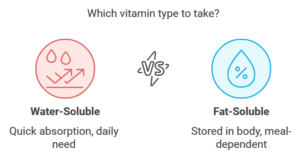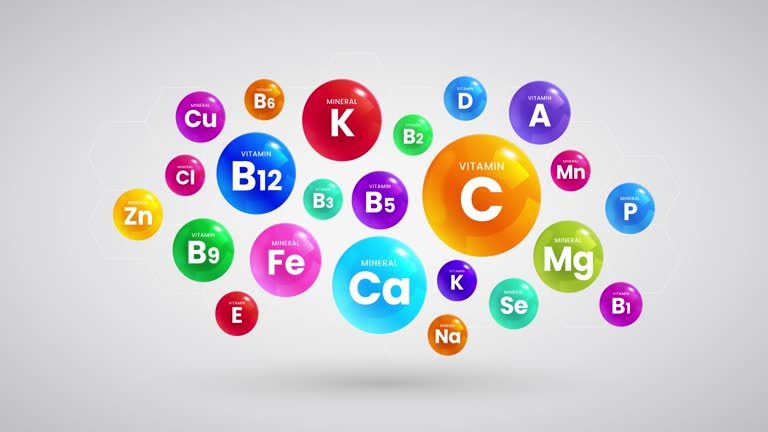
Vitamins and supplements are a huge part of many people’s daily routines, helping to boost energy, support immunity, and fill nutritional gaps. But here’s a question most of us don’t think about: Are we taking them at the right time to get the most benefit? Whether it’s a simple Vitamin C tablet or a more comprehensive multivitamin, timing matters when it comes to absorption and effectiveness.
Most people take their supplements without giving much thought to the best time for optimal absorption. Should you take them in the morning? At night? With meals? Or on an empty stomach? It turns out, the answer isn’t as simple as “anytime works.” The truth is, the timing of your vitamins and supplements can impact how well your body absorbs and uses them. Your body needs 13 essential vitamins — 9 of which are water-soluble and 4 of which are fat-soluble.
Our post, will break down exactly the best times to take different types of vitamins and supplements, why timing is important, and how you can optimize your routine for better health. Keep reading to discover the best practices for making sure your supplements work as hard as you do!
When it comes to maintaining good health, vitamins are essential. But what exactly are they, and why does timing matter so much? Let’s break it down.
What Are Vitamins?
Vitamins are vital nutrients your body needs to function properly. From boosting your immune system to supporting energy production, vitamins play a crucial role in your overall well-being. The catch? Your body can’t produce most of them on its own, meaning you have to get them through food or supplements.
For example, vitamins like Vitamin C support immune function, while Vitamin D is crucial for bone health. However, not everyone gets enough of these nutrients from their diet, which is where supplements come in. But taking vitamins isn’t just about swallowing a pill—it’s about taking them at the right time to ensure your body absorbs them effectively.
Why Timing Matters
Did you know that taking vitamins at the wrong time can reduce their effectiveness? That’s right—when you take your vitamins can impact how well your body absorbs them. Some vitamins are absorbed better on an empty stomach, while others need to be paired with food, especially fats.
This is why timing is key. If you want to get the most out of your supplements, knowing when and how to take them makes all the difference.
Best Time to Take Different Types of Vitamins
Water-Soluble Vitamins
Water-soluble vitamins, like Vitamin C and the B-complex vitamins (B1, B2, B3, B5, B6, B7, B9, B12), dissolve in water. Your body doesn’t store them, so they need to be replenished regularly.
- Best time to take: The morning, on an empty stomach, with a glass of water.
- Why: Since your body doesn’t store water-soluble vitamins, they are absorbed and used quickly. Taking them first thing in the morning gives your body a head start in utilizing these nutrients.
Pro Tip: If you’re feeling low on energy, B-complex vitamins can give you that boost you need to start your day right.
Fat-Soluble Vitamins
Fat-soluble vitamins—like Vitamins A, D, E, and K—work a bit differently. These vitamins are stored in your body’s fat tissues and liver, meaning they don’t need to be taken as frequently. But to be absorbed properly, they need dietary fat.
- Best time to take: With meals that contain healthy fats, such as avocados, nuts, or olive oil.
- Why: Fat-soluble vitamins require fat to be broken down and absorbed by your digestive system. Taking them with a meal ensures that you’re getting the most out of these essential nutrients.
For example, Vitamin D, which supports bone health, is best taken with breakfast if you’re having something rich in fats like eggs or whole milk. It’s not just about taking the supplement—it’s about pairing it with the right kind of meal.

By understanding when to take your vitamins, you can ensure that your body gets the maximum benefit from them. Keep reading to learn more about specific supplements like calcium, magnesium, and iron, and their optimal timing!
Timing for Specific Supplements

When it comes to taking vitamins and supplements, timing really does matter—especially for specific nutrients like calcium, iron, and magnesium. Let’s dive into how you can maximize the benefits by understanding the best times to take them.
Calcium
- Best Time: Split doses throughout the day with meals.
- Why: Calcium is better absorbed when taken with food, but your body can only process so much at once. If you’re taking larger doses, it’s a good idea to divide them up—one with breakfast and one with dinner, for example. This ensures that your body absorbs calcium more effectively, especially when paired with food that enhances its absorption.
Pro Tip: Avoid taking calcium at the same time as iron supplements, as they can interfere with each other’s absorption.
Iron
- Best Time: On an empty stomach, ideally with Vitamin C for better absorption.
- Why: Iron is best absorbed when taken without food, but this can sometimes cause stomach discomfort. To help your body absorb iron more efficiently and reduce stomach upset, take it with a source of Vitamin C, like a glass of orange juice or a Vitamin C supplement.
If you’re worried about nausea, try taking it in the morning before your first meal and see how your body responds. And like calcium, don’t take iron supplements alongside calcium-rich foods or supplements.
Magnesium
- Best Time: Any time of day, but it’s often recommended in the evening.
- Why: Magnesium is known for its relaxing effects, making it ideal for evening or bedtime. It can help reduce muscle tension, promote relaxation, and improve sleep quality. However, it can also be taken in the morning if you prefer. The important thing is to be consistent.
For those who suffer from leg cramps or restless legs at night, taking magnesium before bed might just be the relief you’re looking for.
Factors That Influence Absorption
The way your body absorbs vitamins and supplements isn’t just about the time of day—you also need to consider health conditions, meal patterns, and lifestyle factors. Let’s break down how these elements affect absorption.
Health Conditions
Your unique health needs can affect how well your body absorbs certain supplements. For instance, if you have a digestive disorder like Crohn’s disease or IBS, your body may struggle to absorb nutrients from food or supplements. Similarly, people with vitamin deficiencies may need higher doses or specific timing to optimize absorption. In these cases, working with a healthcare provider to tailor your supplement routine is key.
Meal Patterns
What and when you eat plays a huge role in how your body absorbs vitamins. For example:
- High-fat meals: Great for fat-soluble vitamins like A, D, E, and K. These vitamins need fat to be absorbed, so if you’re taking them on an empty stomach, you’re missing out on their full benefits.
- Intermittent fasting: If you follow an intermittent fasting routine, you’ll need to time your vitamins carefully. Water-soluble vitamins, like B-complex or Vitamin C, can be taken first thing in the morning, but fat-soluble ones should be paired with your first meal after breaking the fast.
Lifestyle & Activity
Your daily routine also affects the best time to take supplements:
- Exercise: If you work out in the morning, taking B-complex vitamins beforehand can help boost energy levels and improve performance.
- Sleep patterns: If you struggle with sleep, taking magnesium or Vitamin D in the evening may help promote better rest.
- Caffeine intake: Be mindful of how much coffee or tea you drink around the time you take supplements. Caffeine can inhibit the absorption of certain vitamins, like calcium and iron.
Common Myths About Vitamin Timing
There’s a lot of misinformation out there about the “right” time to take vitamins. Let’s clear up a couple of common myths:
Myth 1: “All vitamins are best taken in the morning.”
- Reality: While some vitamins, like B-complex and Vitamin C, are great to take in the morning because they boost energy and metabolism, not all vitamins follow this rule. Fat-soluble vitamins, like Vitamin D and Vitamin E, are better absorbed when taken with meals, regardless of the time of day.
Myth 2: “Taking vitamins at night is bad.”
- Reality: It depends on the vitamin. Some, like magnesium and Vitamin D, can actually be beneficial when taken at night because they help promote relaxation and better sleep. Not all supplements interfere with sleep, so don’t be afraid to take them when it fits your routine.
Tips for Building a Consistent Supplement Routine

Taking your vitamins and supplements regularly is just as important as choosing the right ones. Consistency helps ensure your body gets a steady supply of nutrients to function at its best. But with our busy lives, it can be easy to forget. So, how do you build a supplement routine that sticks? Here are some tips to keep you on track.
1. Create a Daily Habit
The key to consistency is making your vitamins part of your daily routine. Whether it’s right after brushing your teeth in the morning or alongside breakfast, pick a time that works best for you and stick to it.
- Morning Routine: If you take water-soluble vitamins like Vitamin C or B-complex, mornings are great because they can give you an energy boost for the day.
- With Meals: Fat-soluble vitamins like A, D, E, and K are best absorbed when taken with meals containing healthy fats. If dinner is your biggest meal, make it part of your evening ritual.
Why it works: Our brains love routines, so by linking your vitamins to an existing habit, you’ll be more likely to remember them.
2. Use Pill Organizers or Phone Reminders
Let’s face it—life gets hectic. Between work, family, and everything in between, it’s easy to forget whether you took your supplements that day. Using tools like pill organizers or phone reminders can be a game changer.
- Pill Organizers: These help you pre-plan your vitamins for the week. No more scrambling to remember what you took and when.
- Phone Reminders: Set daily alarms or notifications on your phone to remind you to take your vitamins at the same time every day.
Why it works: These tools keep you accountable, making it less likely you’ll miss a dose.
3. Consult Healthcare Professionals
Before starting any supplement routine, it’s crucial to consult with a healthcare provider. They can help tailor your vitamin intake to your individual health needs, dietary restrictions, and potential medication interactions.
- Personalized Guidance: Not everyone needs the same vitamins or in the same doses. A doctor can run tests to determine any deficiencies and recommend the right supplements for you.
- Medication Interactions: Some supplements, like calcium or iron, can interfere with medications. Always check with a healthcare professional to avoid unwanted side effects.
Why it works: Expert advice ensures you’re not only taking the right supplements but also getting the most out of them safely.
Introducing Cellgevity: A Powerful Supplement for Cellular Health
When it comes to supporting your overall health, few supplements work as comprehensively as Cellgevity. This unique formula is designed to boost your body’s natural defenses by enhancing glutathione production, a powerful antioxidant that plays a crucial role in maintaining cellular health. If you’re looking for a supplement that goes beyond basic vitamins, Cellgevity could be the perfect addition to your wellness routine.
What Makes Cellgevity Different?
The key ingredient in Cellgevity is RiboCeine, a breakthrough compound that helps your body produce more glutathione. Glutathione is often called the “master antioxidant” because it protects cells from oxidative stress, supports detoxification, and helps maintain optimal energy levels. While your body produces glutathione naturally, production decreases as you age or face health challenges. That’s where Cellgevity steps in, providing the essential building blocks to replenish your body’s glutathione levels.
Beyond RiboCeine, Cellgevity contains other potent nutrients like Vitamin C, Vitamin D, Alpha Lipoic Acid, and Turmeric—all known for their anti-inflammatory and antioxidant properties. Together, these ingredients work to:
- Support immune function
- Enhance detoxification processes
- Improve cellular repair and regeneration
- Boost overall energy and vitality
A solution? Cellgevity

Awaken your cells and Live healthier.
Best Time to Take Cellgevity
So, when is the best time to take Cellgevity to maximize its benefits?
According to product guidelines, it’s recommended to take two capsules twice a day. For the best absorption and effectiveness, take Cellgevity with meals. Since Cellgevity contains fat-soluble ingredients, taking it with food that includes healthy fats (like avocados or olive oil) helps your body absorb the nutrients more efficiently.
- Morning with breakfast: Starting your day with Cellgevity can help boost energy levels and improve focus throughout the day.
- Evening with dinner: Taking it again in the evening ensures that your body continues to repair and protect cells overnight, aiding in recovery and maintaining overall health.
Why it matters: Consistent timing and pairing it with meals rich in healthy fats ensure that your body gets the maximum benefit from each dose of Cellgevity, allowing you to experience better energy, improved detoxification, and enhanced cellular health.
When it comes to taking vitamins and supplements, there’s no one-size-fits-all answer. The best time to take them depends on several factors, including the type of vitamin, your individual health needs, and your daily routine. Water-soluble vitamins, like Vitamin C and B-complex, are typically best taken in the morning on an empty stomach, while fat-soluble vitamins, like A, D, E, and K, should be taken with meals containing healthy fats for optimal absorption.
Creating a routine that fits your lifestyle and health needs is crucial. By taking the time to understand your body’s requirements and working with a healthcare provider, you can ensure you’re getting the most out of your supplements.
FAQ: When Is the Best Time to Take Vitamins and Supplements?
1. Should I take my vitamins in the morning or at night?
It depends on the type of vitamin. Water-soluble vitamins like Vitamin C and B-complex are best taken in the morning because they provide an energy boost. Fat-soluble vitamins, such as Vitamins D and E, should be taken with a meal that contains healthy fats, regardless of the time of day.
2. Can I take all my vitamins together?
Not always. Some vitamins can interfere with each other’s absorption. For instance, calcium can reduce the effectiveness of iron if taken together. It’s a good idea to take calcium and iron at different times of the day and consult with your healthcare provider for specific advice on your supplement routine.
3. Is it bad to take vitamins before bed?
Not necessarily. Certain supplements, like magnesium, are actually beneficial when taken before bed because they can promote relaxation and better sleep. However, some vitamins, such as B-complex, may increase energy levels and are best taken earlier in the day.
4. Do I need to take supplements if I eat a balanced diet?
If you’re consistently eating a balanced diet rich in fruits, vegetables, whole grains, and healthy fats, you might not need supplements. However, due to lifestyle factors, specific health needs, or dietary restrictions, you may still benefit from supplements to fill any nutritional gaps. A healthcare provider can help determine if supplements are right for you.
5. How do I know if I need to take supplements?
Consulting with a healthcare professional is the best way to assess your needs. They can perform blood tests to identify any deficiencies and recommend a personalized supplement plan based on your health profile, diet, and lifestyle.



